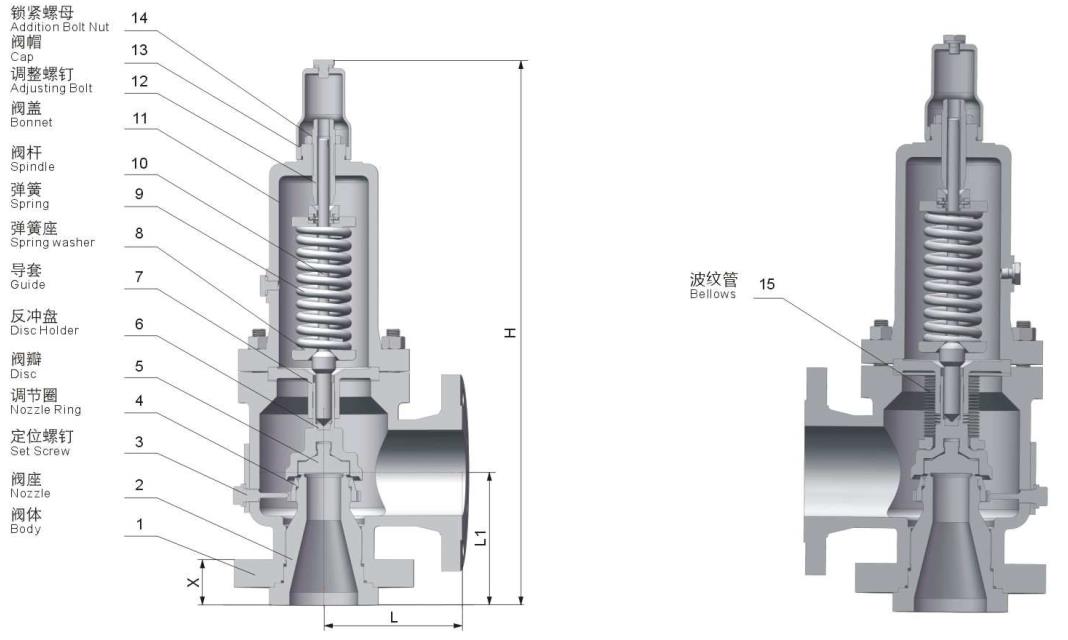Pressure Relief Valve Manufacturers | CNM VALVE
The most professional Pressure Relief Valve/Safety Valve manufacturers in China - CNM VALVE
What is a Pressure Relief Valve?
The pressure relief valve, also known as the safety valve, can be automatically opened and closed according to the working pressure of the system, and is generally installed on the equipment or pipeline of the closed system to protect the safety of the system. When the pressure in the equipment or pipeline exceeds the set pressure of the pressure relief valve, it will automatically open the pressure relief to ensure that the medium pressure in the equipment and pipeline is below the set pressure, protect the equipment and pipeline, and prevent accidents.
Pressure Relief Valve Application
Pressure relief valve can be used in a variety of environments and equipment. A pressure relief valve is a safety valve used to ensure the safety of equipment and operators. They are useful in applications where proper pressure levels are critical to proper and safe operation. Examples include power generation in oil and gas, central heating systems, and multiphase applications in oil refining and chemical processing.
Types of Pressure Relief Valves:
There are two main types of relief valve structures:
1.spring type: The spring pressure relief valve relies on the force of the spring to seal the valve disc and the valve seat.
2.lever type: The lever pressure relief valve relies on the force of the lever and the heavy hammer
With the need of large capacity, there is a pulse pressure relief valve, also known as a pilot pressure relief valve, which consists of a main relief valve and an auxiliary valve. When the medium pressure in the pipeline exceeds the specified pressure value, the auxiliary valve is opened first, the medium enters the main pressure relief valve along the conduit, and the main pressure relief valve is opened to reduce the increased medium pressure.
Parts of Safety Valve:
How does Pressure Relief Valves Work?
The pressure relief valve is designed to withstand the maximum allowable working pressure (MAWP). In the event of an overpressure event in the system, the pressure relief valve detects pressure beyond its designed capability. The pressure relief valve will then exhaust the pressurized fluid or gas to flow out of the system from the auxiliary passage.
How to Calibrate a Pressure Relief Valve?
It is important to calibrate and test the safety valve to ensure that the valve is in proper working condition and will not fail when pressure relief is required. We have professional technicians who can help you solve this problem, if you need, please get in touch with our technicians.
Content that might be helpful to you!
1. What causes an overpressure event?
There are many causes of overpressure, but the most common are usually drain blockages, air leaks, and fires in the system. Even proper inspection and maintenance cannot eliminate the occurrence of leaks. Air pressure relief valves are the only way to ensure a safe environment for the equipment, its surroundings and the operator.
2. What is the difference between prv and psv?
The pressure relief valve is a type similar to the safety valve, also known as the overflow valve. It is specially used in places with high pressure, such as power stations, boilers, and containers. When the pipeline pressure reaches a certain value, the pressure relief valve will not be as The safety valve opens suddenly, and slowly opens according to the proportion of pressure. It will open according to the proportion of the pressure value we adjusted earlier. When the pressure is released to a certain value, the pressure relief valve automatically closes.
3. Why Do I Need a Pressure Relief Valve?



评论
发表评论